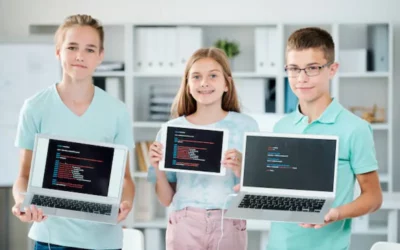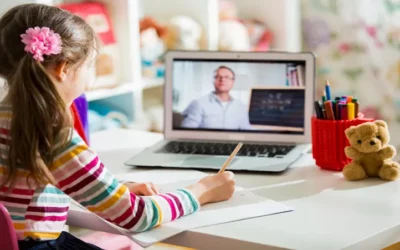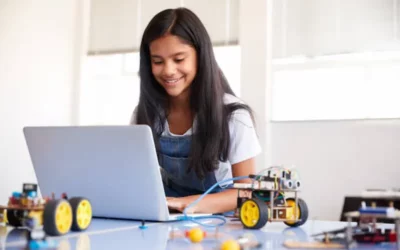Learning the basics of computer programming and computational thinking through entertaining and engaging activities is known as “coding for kids.” Coding is a crucial ability for the future due to the rapid growth of technology and its expanding influence on many facets of our life. Children can acquire problem-solving abilities, logical reasoning, creativity, and critical thinking skills by learning to code at a young age.
Before diving into the blog, You can check out the video.
Table of contents
Introduction
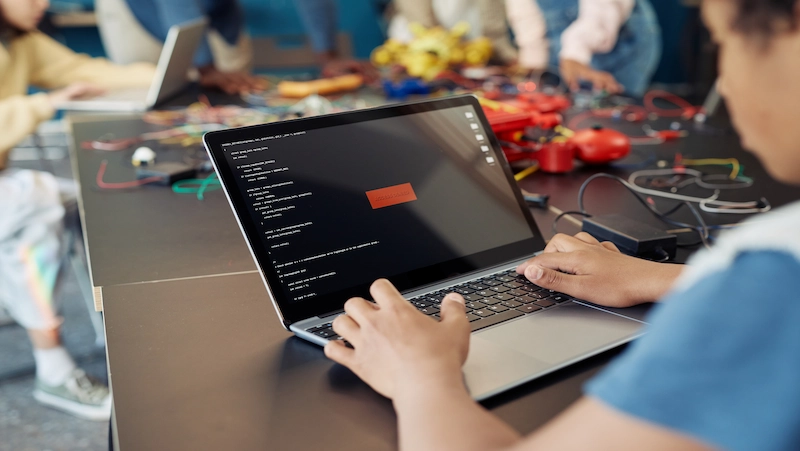
Parents must have thought about, what is coding for kids and why is it so important nowadays. Children are taught the principles of computer programming and coding languages in a pleasant and simple way through the process of “coding for kids.” Coding has developed into a crucial ability for the next generation in the modern world, where technology is heavily ingrained in every area of our life. In light of the quick development of technology, teaching children to code at a young age is becoming more and more important.
First and foremost, teaching kids to code develops critical thinking skills for kids and problem-solving skills. It helps kids to divide complicated issues down into smaller, more manageable pieces, analyze them, and come up with reasonable answers. These abilities go beyond coding and are useful in a wide range of real-world situations, including math, science, and creative endeavors.
Additionally, learning to code enables kids to create technology rather than just consume it. It stokes their imaginations and frees them to pursue creative ideas and endeavors. Children can use code to make their fantasies come true, whether they’re creating websites, robots, or video games from scratch. This practical training equips them with the empowerment, self-assurance, and growth attitude they need to meet the challenges of the digital age.
Furthermore, in today’s work market, coding abilities are becoming more and more important. Numerous industries, from software development and cyber security to data analysis and artificial intelligence, are experiencing an exponential rise in the demand for workers with coding skills. Early exposure to coding gives kids a vital skill set that opens up professional prospects later on and boosts their competitiveness in the digital economy.
Coding also encourages cooperation and teamwork. Working on projects with peers is a common part of many coding exercises, which helps kids develop their communication, idea-sharing, and problem-solving skills. Important social and interpersonal skills are developed through these cooperative experiences, which are crucial in the connected world we live in.
Understanding the basics of coding
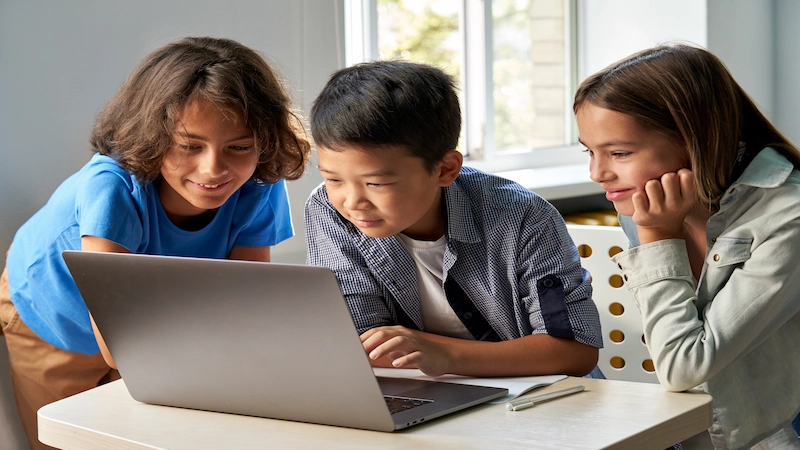
A set of instructions called a programming language tells a machine what to do. It is a formal language that describes a series of steps that can be used to generate different sorts of output. A wide range of computer science disciplines, including software development, artificial intelligence, and data science, use programming languages.
Programming languages come in a wide variety, each with unique advantages and disadvantages. Python, Java, C++, and JavaScript are a few of the most widely used programming languages. Programmers must select the appropriate language for the task at hand because every language has a different syntax and set of features.
A program is essentially a set of instructions that a programmer creates for a machine to execute. The computer will carry out the instructions to create the required output because they are written in a language that it can understand.
The instructions are subsequently interpreted by the computer, which then performs each one individually. The program will be finished when the computer reaches the conclusion of the instructions.
A powerful tool that may be used to construct a wide range of software is a programming language. By picking up a programming language, you can access a world of opportunities and build your own websites, games, and applications.
The following are a few advantages of learning a programming language:
Your own software can be written. You can make your own applications, games, and websites by using a programming language. This provides you the independence to produce precisely what you desire, independent of the needs of others.
You can find employment in the tech sector. There is a big need for qualified programmers because the tech sector is one of the sectors with the strongest growth rates worldwide. You can improve your chances of landing a job in this fascinating industry by learning a programming language.
You can discover how computers operate. You may see how computers function from behind the scenes by using programming languages. This information can be useful for solving issues, debugging code, and creating new software, among many other things.
There are numerous tools available to assist you in getting started if you are interested in learning a programming language. You may learn the fundamentals of programming from books, websites, and online classes. After mastering the fundamentals, you can practice by writing brief programs. You will learn the language more quickly and be able to write more intricate programs as you practice.
The process of learning a programming language can be difficult but rewarding. You may design your own software and unlock a world of possibilities by investing the time to master a programming language.
Benefits of learning to code for kids

Learning to code at a young age provides numerous benefits for children that extend far beyond the realm of computer science. In today’s technology-driven world, coding has become a fundamental skill that empowers children to navigate and thrive in the digital landscape. Here are some of the key advantages of learning to code for kids.
Here are some of the benefits of learning to code for kids:
- Problem-solving skills: Coding teaches kids how to break down problems into smaller, more manageable steps. This is a valuable skill that can be applied to all areas of life, from schoolwork to everyday challenges.
- Critical thinking skills: Coding requires kids to think critically about how to solve problems. They need to be able to identify the root of the problem, come up with multiple solutions, and evaluate the pros and cons of each solution.
- Creativity: Coding can be a very creative outlet for kids. They can use their imagination to come up with new ideas and solutions.
- Collaboration: Coding projects often require kids to work together with others. This teaches them how to communicate effectively, share ideas, and compromise.
- Self-confidence: When kids learn to code, they achieve something that is challenging and rewarding. This can boost their self-confidence and give them a sense of accomplishment.
- Career opportunities: The demand for skilled coders is growing rapidly. By learning kids coding language, they can give themselves a head start on a successful career in technology.
In addition to these benefits, coding can also help kids develop a variety of other skills, such as:
- Math skills: Coding requires kids to use math concepts, such as addition, subtraction, multiplication, and division.
- Writing skills: Coding requires kids to write clear and concise instructions.
- Reading skills: Coding requires kids to read and understand code.
- Problem-solving skills: Coding requires kids to identify and solve problems.
- Critical thinking skills: Coding requires kids to think critically about how to solve problems.
- Creativity: Coding can be a very creative outlet for kids. They can use their imagination to come up with new ideas and solutions.
- Collaboration: Coding projects often require kids to work together with others. This teaches them how to communicate effectively, share ideas, and compromise.
- Self-confidence: When kids learn to code, they achieve something that is challenging and rewarding. This can boost their self-confidence and give them a sense of accomplishment.
If you are interested in teaching your child to code, there are many resources available online and in libraries. There are also many coding camps and classes available for kids of all ages.
Tools and resources for kids to learn to code
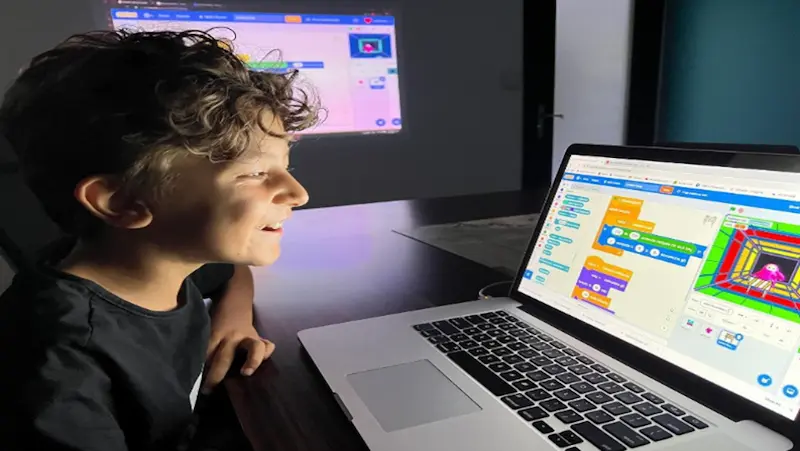
Coding has become a crucial skill for students to learn in the modern digital age. It not only develops their capacity for problem-solving but also nurtures creativity and rational thought. Fortunately, there are many tools and resources available to support kids as they begin their path into coding. Kids may learn and explore coding topics in a pleasant and exciting setting thanks to these materials. Computer games for kids are another way to develop your child’s interest in programming.
To assist children in learning to code, a variety of tools and resources are available. Among the most popular choices are:
Scratch
For children of all ages, there is a free coding for kids program available online which teaches a programming language called Scratch. It is simple to use and comes with a large selection of building blocks that can be combined to make animations, coding games for kids, and other interactive projects.
Python
Web development, data analysis, and machine learning are just a few of the tasks that require the well-liked programming language Python. Python for kids offers a variety of tools, including books, coding websites for kids, and online courses.
JavaScript
Another well-liked programming language that is utilized to make dynamic websites is JavaScript. Kids can learn JavaScript using a variety of materials, including books, websites, and online courses.
HTML and CSS
Other significant programming languages used to build websites include HTML and CSS. A web page’s content is organized using HTML, and its visual aspects are managed using CSS. Children can learn HTML and CSS using a variety of tools, including books, websites, and online courses.
There are numerous general-purpose coding tools available as well as these particular programming languages, which can be helpful for kids. These tools can instruct young people about the principles of programming, including logic, problem-solving, and algorithms. The following are some of the most well-liked general-purpose coding resources:
Brightchamps
BrightCHAMPS is committed to helping kids develop strong coding skills that will serve them well throughout their lives. Their Coding Classes for kids offer a range of features that make learning about coding fun and effective, from learning with stories to bite-sized lessons with real-world examples; learning through play, global assessments & certificates, and interaction with mentors.
By enrolling your children in BrightCHAMPS, they can build a solid foundation for coding success and develop habits that will serve them well for years to come.
Code.org
Children of all ages can access free coding resources from the nonprofit organization Code.org. Kids may learn to code by participating in a range of interactive games, activities, and tutorials available on Code.org.
Khan Academy
A free online computer science course for children is available from Khan Academy. Variables, loops, and functions are among the fundamentals of programming that are covered throughout the course.
Udacity
Children can take a range of computer science courses online at Udacity. Courses at Udacity are more difficult than those at Code.org because they include things like data structures and algorithms.
The most crucial thing is to make sure that your youngster is having fun, regardless of the programming language or resource you select. Your child will benefit from learning to code throughout their life, and it can be a tough but gratifying experience.
Here are some more pointers for teaching your kid to code:
- begin early. Young children can begin learning to code. They can still learn the fundamentals of logic and problem-solving even if they are not yet ready to study a specific programming language.
- Funnel it out. Coding lessons ought to be enjoyable. Kids can learn to code in a variety of ways, including through games, puzzles, and other interactive activities.
- Be tolerant. It takes time and practice to learn to code. If your toddler doesn’t grasp something straight away, try again later. They will eventually succeed if you only keep practicing.
- Get active. Getting involved directly is the best method to teach your youngster to code. Along with your youngster, gain knowledge of coding to assist in problem-solving.
You may put some work into teaching your child to code, giving them a talent that will serve them well for years to come.
Tips for parents and educators to teach coding to kids
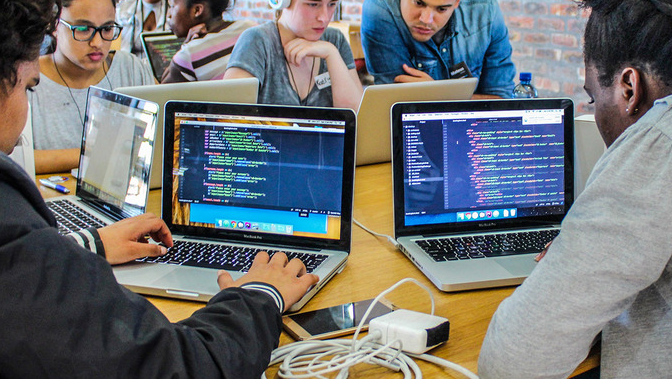
Teaching coding to kids is becoming increasingly important in today’s digital age. It equips them with essential skills for the future and fosters creativity, problem-solving, and logical thinking. Whether you’re a parent or an educator, here are some tips to help you teach coding effectively to kids.
- Start with the basics: Begin by introducing kids to the fundamental concepts of coding, such as algorithms, loops, and conditional statements. Use simple, visual programming languages or block-based coding platforms that provide a user-friendly interface.
- Make it fun and interactive: Engage kids in hands-on activities and projects that make coding enjoyable. Use games, puzzles, and challenges to teach coding concepts. Encourage creativity by allowing them to create their own projects and express their ideas through coding.
- Break complex tasks into smaller steps: Coding can be overwhelming, especially for beginners. Break down complex tasks into smaller, manageable steps. Teach kids to approach problems systematically and encourage them to think critically and logically.
- Encourage collaboration: Foster a collaborative learning environment where kids can work together and learn from one another. Group projects, coding clubs, or coding camps can provide opportunities for kids to share ideas, solve problems collectively, and enhance their coding skills through teamwork.
- Provide real-world examples: Connect coding to real-life scenarios to make it more relevant and practical for kids. Show them how coding is used in everyday technology, such as websites, apps, or robotics. Encourage them to think about how they can apply coding to solve real-world problems.
Use visual aids and resources: Utilize visual aids like flowcharts, diagrams, and videos to simplify complex coding concepts. There are numerous online resources, coding apps, and interactive tutorials designed specifically for kids that can supplement your teaching.
Celebrate achievements: Recognize and celebrate kids’ accomplishments in coding. Acknowledge their progress, no matter how small, to boost their confidence and motivation. Showcase their projects to friends and family or organize coding competitions to highlight their achievements.
Be a facilitator and guide: As a parent or educator, your role is to facilitate learning and guide kids along their coding journey. Be patient, supportive, and encourage them to explore their own interests within coding. Provide guidance when needed, but also let them learn through trial and error.
By following these tips, parents and educators can create a positive and engaging environment for teaching coding to kids. Remember, the goal is to spark their interest, nurture their problem-solving abilities, and empower them to become creators in the digital world, focusing on children programming.
Conclusion
In conclusion, teaching children to code is a great skill that has many advantages. In order to help your child’s educational path, it is essential for parents to have a fundamental understanding of coding. Coding develops children’s critical thinking, creativity, and problem-solving skills in addition to giving them the tools to navigate an increasingly digital environment. Parents can encourage their children to take an active role in determining the future by giving them the opportunity to participate in coding activities. So urge your youngster to start this thrilling and transforming journey by embracing coding as a doorway to unlimited possibilities. Together, with your leadership and their increasing coding proficiency, you can open up a world of invention and success.
Frequently Asked Questions
Giving instructions to a computer through coding allows you to get the results you want from it. It’s similar to writing a computer recipe. By breaking down activities into manageable steps and utilizing specific languages or graphic blocks to develop programs, children can learn how to code.
Kids should learn to code because it improves their ability to solve problems, nurtures logical thought, encourages creativity, and gets them ready for the future of technology. They gain the ability to comprehend and influence technology, their computational abilities are enhanced, and the world of today offers them a wide range of professional options.
Children can learn the popular coding languages Scratch, Python, JavaScript, and Swift. They provide tools and user-friendly interfaces made especially for introducing programming principles in a fun and approachable way.
By pushing youngsters to break down difficult problems into smaller, manageable tasks, analyze patterns and logical sequences, test and improve their answers, and so on, coding helps kids develop problem-solving and critical thinking skills. It encourages innovation, tenacity, and a methodical approach to problem-solving.
Children can like coding! While it may initially appear challenging, kids can enjoy the creative process of coding while learning problem-solving skills and developing their imagination using fun and age-appropriate tools, games, and projects.
Science?
Yes, even if they don’t want to pursue a profession in computer science, youngsters can still benefit much from learning to code. It boosts their capacity to comprehend and interact with technology in a variety of disciplines and encourages the development of problem-solving abilities, logical thinking, and creativity.
Kids who know how to code can make a wide range of things, including easy games, interactive stories, animations, websites, and even simple robots. In addition to improving their coding skills, these projects also encourage creativity and problem-solving ability.
Children’s coding resources such as Scratch, Code.org, Tynker, and Blockly are age-appropriate. These platforms include interesting and dynamic programming tasks that are specially made for kids, making it enjoyable for them to learn the fundamentals of coding.
Depending on the child’s age, area of interest, and schedule, the recommended daily or weekly learning time for coding can change. Aim for at least 30 to 60 minutes of coding practice multiple times a week as a general rule of thumb.
Yes, by participating in unplugged activities like board games, puzzles, and practical programming for kids activities, kids can learn fundamental coding ideas without using a computer or tablet. These exercises impart key coding concepts without the need for electronic gadgets.


 We are an army of educators and passionate learners from BrightChamps family, committed to providing free learning resources to kids, parents & students.
We are an army of educators and passionate learners from BrightChamps family, committed to providing free learning resources to kids, parents & students.









